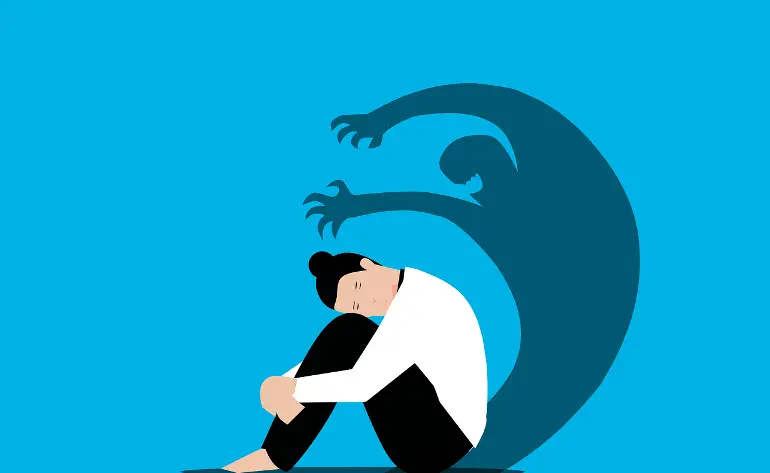Anxiety attacks can seem to strike out of nowhere, their tidal wave of fear, panic and racing thoughts hitting you at full force. Also known as panic attacks, these episodes can be disorienting and downright terrifying while they’re happening.
Though the feelings are intensely uncomfortable, the good news is that anxiety attacks are temporary and survivable. We asked three therapists to share their best advice for getting through an anxiety attack with greater ease.
From preventative steps you can take in advance, to what to do in the heat of the moment, to how to recover afterward, here are practical tips and reassuring words for facing down an anxiety attack.
What Is An Anxiety Attack?
An anxiety attack, also known as a panic attack, is a sudden surge of intense fear, panic and discomfort that peaks within minutes. The exact causes are complex, but anxiety attacks are essentially an misfiring of the body’s natural fight-or-flight response to danger.
Even when no real threat exists, the brain and body react as if something catastrophic is happening. Anxiety attacks can be brought on by high stress, certain medical conditions, trauma triggers, or sudden spikes in anxiety.
The good news is that even though an anxiety attack feels consuming in the moment, it will pass naturally and is not dangerous.
Here’s What The Experts Have To Say About Anxiety Attacks
When Tracy Sciulli, MS, LPC, a licensed professional counselor with Philadelphia Integrative Psychiatry was a young adult, she experienced her first panic attack. “It was as if my mind and body were on a runaway train and I was clueless about what was happening, let alone how to bring that train back to the station.”
Sciulli explained that her heart started to pound, sweat poured over her face, and her hands began to shake. She felt weak throughout her body and her mind started racing to search for an answer or a reason.
“Each second seemed to usher in faster thoughts that got more catastrophic,” she remembered. I thought I was having a heart attack or that something terrible was going to happen to me.”
Today, Sciulli uses her experiences with panic attacks to connect with her clients and offer insight into how to cope. She explained that the starting point for a panic attack is different for everyone.
“A fearful thought or worry could cross their mind followed by the onslaught of physical symptoms, and then those fearful thoughts get reinforced and worse,” she said. “For others, the feeling of a racing heartbeat or tightness in their chest could be what starts the panicked thinking, ‘What’s wrong? What’s happening to me.’”
Sciulli explained that when a panic attack begins, the mind and body are perceiving a threat and responding in a way to counter that threat. This stress response is the same thing you experience when you are escaping danger or defending yourself, she said.
Though panic attacks happen when there is no immediate threat, your body believes there is and is doing what it is designed to do.
Anxiety Attacks Are a Threat Response
According to the American Psychological Association, a panic attack is a sudden, overwhelming sense of fear or dread that comes out of nowhere. It can be accompanied by a racing heart, difficulty breathing, and paralyzing terror.
You also may experience sweating, shaking, tightness in your chest, hyperventilating, increased body temperature, and feeling something awful is going to happen, Meka Allen, DSW, LCSW, the executive director of Embark Behavioral Health in Scottsdale, told Health.
“A person may also believe they are having a heart attack or that they are dying,” she said. Panic attacks can occur alongside other mental health conditions including anxiety, mood disorders, and substance abuse disorders.
Panic attacks happen suddenly with no apparent cause or trigger, explained Jaryd Hiser, PhD, a psychologist at The Ohio State University Wexner Medical Center and assistant professor, the Department of Psychiatry & Behavioral Health, The Ohio State University College of Medicine.
“These episodes typically reach a peak within minutes and only last for short periods of time (about 15 to 20 minutes),” he said.
“Panic and anxiety are normal and adaptive responses present from birth. We feel those emotions to help us stay safe,” Sciulli said. “Panic attacks occur most when we start to over-generalize what is considered to be a threat or we don’t have the skills to cope with what we are thinking about or feeling.”
Several factors including genetics, having close relatives who experience panic attacks, mental health conditions like anxiety or PTSD (post-traumatic stress disorder), and excessive caffeine consumption can elevate an individual’s risk of panic attacks.
“Panic attacks can occur because of chronic stress, anxiety, specific phobias, or an environmental or situational trigger—but the trigger isn’t always obvious,” said Carnes. “For example, I know that my panic attacks tend to be triggered by turbulence while flying…Those who have not experienced panic attacks may dismiss them as overreactions to life stress or ploys for attention.”
“We pay attention to automatic thoughts that get our attention the most,” she said. “So it makes sense that when something terrible or awful crosses our mind, it gets our attention.”
Trying to Prevent Anxiety Attacks May Not Help
According to Sciulli, practicing mindfulness, engaging in cognitive behavioral therapy (CBT), and giving yourself grace can help control what you want to be thinking about next.
“Catching the panicked thoughts early in their tracks and talking back to them reinforces that while you can’t stop the automatic thoughts that can start a panic attack, you can change the course of your thoughts to stop having a full panic attack,” she said.
But, you are already escalating into a panic attack, these strategies won’t work because your body is too far into the fight or flight response.
“That’s when body-based strategies such as deep breathing, specifically slowing down the rate of breathing, distraction through intense sensations such as using cold therapy or sour candy, or tuning into a really engaging show, song, or podcast is more effective,” Sciulli said.
This can sometimes begin a cycle of stress, noted Hiser. “Sometimes the more we try to prevent panic attacks, the more fixated we become on physical symptoms and fall into the trap of attention bias.”
He explained that focusing on your breathing can sometimes initiate hyperfixation on your breathing—whether it’s too fast, too slow, deep enough, etc. That focus has the potential to turn to stress about what you believe your body is doing.
“Anxiety is not a bad thing,” Lev said. “Our sympathetic nervous system does what it does and actually, it’s very healthy and good for us. Panic attacks, in reality, bring us back to homeostasis within three to four minutes, but when our minds continue to tell stories that something is bad or dangerous, then what happens is that we retrigger ourselves, exacerbate it, and it continues to get worse and worse.”
What Experts Recommend You Do During an Anxiety Attack
Having a panic attack can be overwhelming and leave you wondering how to manage the intense emotions and physical sensations you are experiencing.
For this reason, finding a quiet space where you will not feel overwhelmed and can focus on deep breathing, utilize grounding exercises, and use progressive muscle relaxation to help calm your body. Sometimes trying to focus on deep breathing in the midst of the situation can be too much, and lead to feeling worse.
Taking deep breaths as soon as you notice your heart rate rising and redirecting upsetting thoughts. “I’m a big fan of using music, podcasts, and physical activity…to redirect my attention,” one therapist explains. “I know that it is possible to create habits to support a healthy nervous system and minimize future panic attacks.”
Because panic attacks do not tend to last a long time, Carnes explained the key for her has been to find techniques that allow her to reconnect with her physical body “Coping skills that soothe us, ultimately enabling us to surf this intense and unpleasant—but temporary—wave of emotion [are the most beneficial],” she said.
One of her favorites is the 5-4-3-2-1 technique. “This involves naming five things you can see, four things you can hear, three things you can feel, two things you can smell, and one thing you can taste.”
Adding Adaptogens To Your Daily Regimen
In recent years, more people have been turning to adaptogens – natural substances derived from plants that help the body manage stress. One of the most popular adaptogens is ashwagandha, an ancient medicinal herb used for thousands of years in Ayurvedic healing traditions.
Modern research has shown that ashwagandha can be highly effective at controlling anxiety and reducing the intensity of panic attacks. The compounds in ashwagandha help regulate cortisol levels and calm excessive activity in the sympathetic nervous system. This provides a soothing effect for both the mind and body.
Regularly taking ashwagandha supplements can help keep anxiety and panic attacks at bay. Some studies have found it can reduce anxiety symptoms by over 50%. People report fewer attacks overall, and those they do have are less severe.
Ashwagandha is not a quick fix or cure, but can be a helpful part of an overall anxiety management plan. Along with therapy, lifestyle changes and other coping strategies, ashwagandha can help restore a sense of calm and greatly improve anxiety control. For those struggling with frequent anxiety attacks, exploring ashwagandha may provide much-needed relief.
Click Here To Check Out Starwest Botanicals Organically Grown Ashwaghanda Powder
They Also Have Capsules Available
In Conclusion
While anxiety attacks are undeniably scary and unpleasant while they’re happening, there are many effective ways to get through them. Using preventative strategies can reduce their frequency and intensity.
When an attack starts, you have many tools to ride it out, from controlled breathing to sensory grounding techniques. And remembering to be gentle with yourself afterward can help you recover and reduce future attacks.
Though difficult, anxiety attacks are manageable with the right coping strategies. By implementing some of the tips provided here, you can alleviate anxiety attack suffering and take back control. With time and practice, you can build resilience and greatly reduce their impact on your life.






